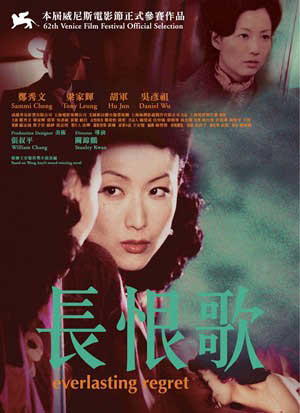
Film review by Lee Alon

There have been a few homages to romantic cities in the past, several remarkably similar to Stanley Kwan's new release starring Sammi Cheng as a perennial femme fatale. Now, that latter concept in itself should suffice in sending anyone following HK cinema to the hills. Sammi? Sultry screen siren? What the hell's next, Zhang Ziyi in a Japanese movie? Wait a minute..
Regardless, off the bat it becomes immediately clear Sammi's no longer Sammi. It's like an invasion of bodysnatchers with a twist, since she doesn't even look like herself anymore. Previously a slacker-generation mistress of comedy, Cheng's transformation courtesy of the makeup department reveals a wider aspect of her range, particularly in portraying various ages, and later in the movie you begin to appreciate her as an older version of herself. However, much like Everlasting Regret as a whole, so does Sammi suffer from a certain disjointedness, with quality ups and downs guaranteed to leave audiences confused.
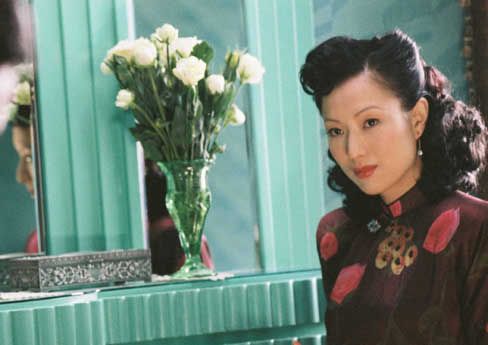
Much the same can be said of this film in its entirety. It really wishes to be a Wong Kar Wai product mixed in with period décor and mood. Additionally, the generation-hop resembles what we’ve before seen in Kwan's own Center Stage, of which Everlasting Regret is practically a clone, albeit without the same zest and soul. Center Stage, with Maggie Cheung, has class and solidity enough for multiple entries, while this current romp fails to truly impress. The story declares its love of Shanghai early on with some rather obscure and flat quote going on about "if your city is no longer your city" and so forth, an instant warning sign seeing as it seems pretentious as opposed to meaningful.
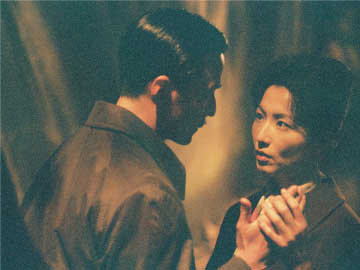
From then on, we follow Wang Qiyao (Sammi) through numerous travails dating from the late Nationalist period (1947) to circa Deng Xiaoping's reformation of mainland China (early 80's). The problem with all this is lack of a cohesive thread, as events often bounce along inexplicably, and the movie never reaches the same seamless integration a quality production aspires to provide. Consequently, viewers feel detached from their onscreen counterparts, denied caring for Qiyao and her fellow characters through erratic, mundane storytelling.
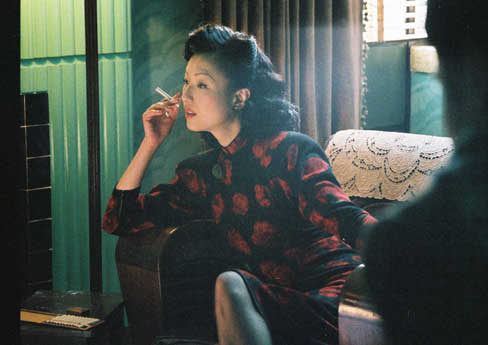
Some elements of ER click into place neatly, like stage design, props and makeup. But these technical dimensions often succeed in HK films while that elusive X factor flounders by the wayside. Here it happens again as we witness the heroine grow up and ascend Shanghai's ranks of glittering celebrities. Starting with the post-WWII, pre-communist heyday, Qiyao's simple beauty and sharp, if a bit cold, personality win her the love of several men, powerful as well as down to earth and honest. On the upside, Everlasting Regret never claims its main protagonist is either good or bad, apparently opting to have third parties make that judgment.
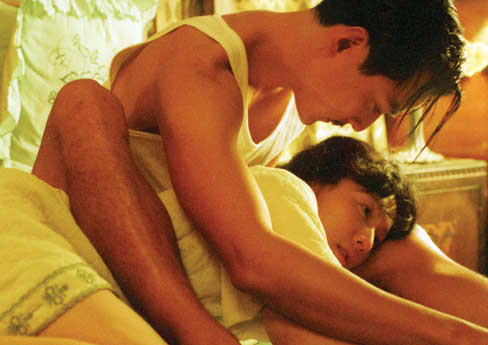
Back to the men. There's Hu Jun as Officer Li, a government power broker that initiates Qiyao in the ways of sex, intrigue and seduction. Hu does well as always, his electricity and masculine appeal going the distance. Later, after Li vanishes as the PRC comes into being, we get excellent Tony Leung Ka Fai in a role worthy of his talent and experience. He plays Mr. Cheng, a fashion photographer responsible for discovering Qiyao in the first place. Contrary to Leung's recent embarrassment in The Myth, here he's back in form, faithfully rendering his character as it ages and matures. The two younger males that come to dominate much of Wang Qiyao's life aren't up to standards set by their seniors, we sadly must conclude, especially Daniel Wu. This guy may be getting too prolific for his own good, as in ER little of the usual panache associated with his work makes it to the fore.
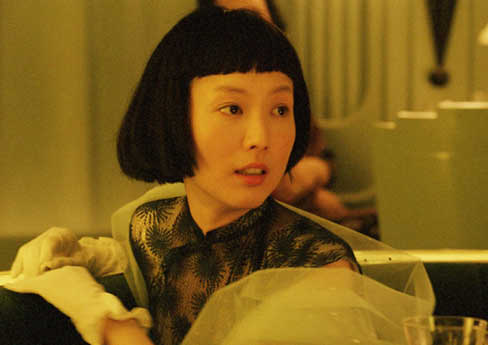
Wu depicts Qiyao's lover Ming, a sensitive individual with much less backbone than money, who feels the crunch of 1950's China. While mediocre in its portrayal, this part of the feature at least sheds light on a forgotten part of history, letting us know fun and normalcy didn't come to a complete end in 1949: according to Kwan, Shanghai was still very much a party place even after Mao and crew took over. A bit better is Huang Jue as Kela, a dashing youngster who falls for Qiyao even when the feeling's not entirely mutual. Kela symbolizes the turmoil of new China, as the country emerges from its Cultural Revolution mire and faces rekindled excitement mixed with greed, rife with black markets, uncertainty and disorientation.
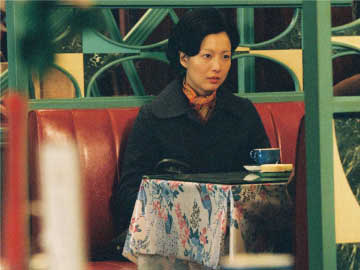
There are a few good female supporting roles, namely newcomer Huang Yi (Brotherhood a couple years back and a bunch of mainland martial arts soaps) as Qiyao's rebellious daughter, and Su Yan, providing input and balance as Qiyao's schoolmate and best friend Lili. Su Yan's gorgeous face buoys her along nicely, but you can't help feel her Beijing opera-esque OTT'ness goes against the grain of straight-faced dramas.
Effectively, there's a haunting sensation pervading Everlasting Regret, as if the editing people were told to make it under 120 minutes, hence what strike us as gaps in the story. This sort of tilt results in most of the good stuff concentrated towards the end, as both Mr. Cheng and Qiyao (or Tony Leung and Sammi) showcase their true colors and shine through despite all the hurdles.
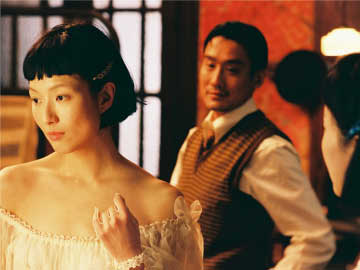
Wish we could determine the same about the film proper. Aside from good execution on the part of its cast, Everlasting Regret doesn't attain any of its goals, at least the ones evident from demeanor and construction. It's not an epic, sweeping saga transcending time and space, nor a workable tearjerker. In fact, you'd be unique if any overt emotion welled in you while watching. This also includes boredom, for although by no means a resounding success, ER likewise doesn't constitute a failure.
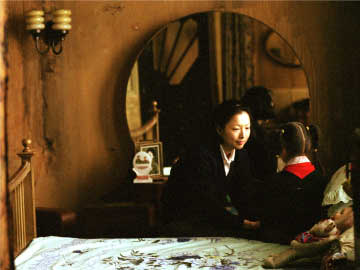
People with keen interest in Shanghai history may find more value in sitting down to watch it, as may be the case for Sammi nuts eager to scope their idol's evolution. For casual and seasoned movie buffs outside these two groups, Everlasting Regret presents much less of an incentive, and shouldn't take priority over other offerings as the case may be.
Rating: 6/10
Directed by Stanley Kwan
Starring Sammi Cheng, Tony Leung Ka Fai, Hu
Jun, Daniel Wu, Huang Yi
2005, Putonghua, 115 minutes
Contact Lee Alon here